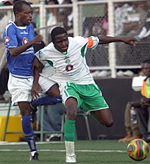Rebrand Tiger fishing tourney

On catching it, the fish’s initial run is fast and strong and is usually followed by spectacular leaps of one or two metres into the air to shake off the hook, and then a series of deep, determined runs, which chew every ounce of strength from this magnificent game fish.
Finally, after about 10 minutes of fighting, the tiger fish is pulled, belly-up, to the side of the boat, where it tries to make one or two last breaks to freedom — like a man trying to break from chains — but is gaffed and brought onto the boat.
The very tackle many fishermen use for tiger is in itself, a telling tribute to the fighting qualities of Africa’s most elusive, ferocious and speedy game fish.
The tiger is just in a class of its own.
The sporting quality of tiger fish can only be truly appreciated if fairly light tackle — with one to four kg line — is used.
Tiger fish is Africa’s most elusive, finest and flamboyant game fish.
It possesses a ferocious set of razor-sharp teeth enclosed in a bony head.
Its blue or blackish lateral stripes — like a land tiger — and bright red to yellow caudal fin completes the picture. Females are larger than the males.
Tiger fish is known for its sheer speed and aggression, pound for pound and is ranked as the world’s most powerful fresh water species.
For any discerning fisherman, catching the tiger is the greatest experience as the fish bravely darts from one place to another, leaping upwards, downwards and sideways for several minutes before eventually succumbing to the angler.
The annual Kariba tournament is meant to capture the biggest tiger fish of the year and the current record is that of 15, 507kg caught in Lake Kariba in 1962.
The first tournament was organised by the Rhodesian National Anglers Union and took place in June 1962, with 142 fishermen participating.
In the southern hemisphere, the biggest tiger fish caught and dubbed the Goliath weighed about 45kg.
There is no question the importance this tournament has in the international angling calendar, and win or lose, it is just a great event to be part of.
In Zimbabwe, tiger is distributed throughout the Kariba Dam, the Zambezi River and its tributaries. The tiger is also found in Lake Chivero and Manyame Dam. Naunetsi, Bubi and Mzingwane rivers also have tiger fish.
Its primary food is kapenta, bream, cat fish and squeakers. They also eat their own kind as long as it is less than 40 percent their body weight.
It is fascination with this game fish that led to the formation of the Kariba International Tiger Fishing Competition, now the Kariba Tiger Invitational Fishing Competition, which has run for 49 years, simply to catch this game fish. It is a huge international fishing event, which attracted 150 teams from all over the world.
Kariba Dam is shared by Zimbabwe and Zambia but the Zimbabwean side has, for long, been famed for hosting the tiger tournament.
The tournament has, however, been largely a preserve of the white community, who have successfully hosted it. They must be given credit for their consistency and creativity. Year in year out, they have been able to organise and host the tournament without fail.
The pomp and fanfare associated with the tournament has largely eluded the ordinary people of Kariba. Except for the mention of the name Kariba, the tournament clearly lacks the Zimbabwean flavour. There is need to flavour the tournament.
Last Friday evening, I found myself arriving at the tournament venue in Charara, Kariba, for the prize giving ceremony and I saw these poor chaps, the ordinary residents of Kariba closed out because they had failed to pay US$5 to enter the venue.
Scores of them gathered outside the venue, wondering what was happening inside.
In my opinion, the ordinary residents of Kariba were supposed to enjoy the event, watching the fishermen, negotiating business deals and of course, selling their wares.
Being a member of this fraternity, I was of course, allowed in without problems but what touched me was that the main banner, had nothing that suggested that the tournament was in Zimbabwe.
There was no mention of even National Parks and Wildlife Management Authority, the custodians of Lake Kariba’s tiger fish. Without national parks, there would be no tiger fish to talk about in Kariba. The tournament logo had all other ingredients of an organised event, but seriously and critically lacked the Zimbabwe flavour, like the national flag, the parks logo, the ZTA logo and others because all one could see was Nissan, Nashua, Mainstay International, KITFIT, Remmington Gold etc.
Disease control, poaching control and herding of fish is done by national parks, but at the tournament, you do not get to hear anything about parks or about Zimbabwe.
The fishing tournament is a tourist event but the Zimbabwe Tourism Authority was nowhere mentioned or invited to the tournament.
One could ask today, how much revenue was generated at the tournament and what impact did it have on our tourism sector?
Black Zimbabweans should start participating at these tournaments so that they become truly Zimbabwean. I am by no means suggesting that the tournament should be taken away from the current hands but I am calling for rebranding so that it becomes a Zimbabwean tournament.
The local people of Kariba should identify with this prestigious tournament.
The tournament should be a tourism forum.
It should be a marketing forum and a social forum in which Zimbabweans and foreigners converge, play and discuss what is good for both.
It should be that moment always waited for by the people of Kariba.
The moment in which the people of Kariba can sell their sculpture, their handicraft and also socialise.
There is no doubt that the Kariba International Tournament will next year attract more participants. The success of this tournament is a tribute to the popularity of tiger fishing.










Comments